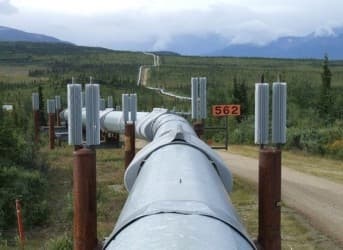Canadian Natural Resources Minister Joe Oliver said natural resources are the cornerstone of the federal and provincial economies. The U.S. economy, on the road to modest recovery, remains central to a Canadian oil market that relies heavily on exports. Oliver said at an investment conference in Quebec that the natural resources sector represents about 20 percent of the gross domestic product. The Canadian economy has suffered, however, because there aren't many new conduits to get oil exports to foreign markets. The potential to reach Asian could provide a relief valve for the Canadian economy, while the option still exists to ship oil through the United States for exports. With opposition mounting along the borders, however, Canada's export-driven economy may become landlocked.
"Our natural resources are one of the cornerstones of the economic development of Quebec and Canada," Oliver said.
Related article: US Energy Infrastructure Fails to Keep Pace with Boom
Oliver said the natural resources sector accounts for about 1.6 million Canadian jobs and represents about one-fifth of the GDP. Canada is in the top tier in terms of oil production. Nearly all of its oil exists in so-called oil sands and the federal government now controls enough of that type of crude to put Canada behind Saudi Arabia and Venezuela globally. Most of the economy is structured around oil exports and almost all of those exports are directed toward U.S. refineries. Oliver said that could change, however, given growing demands from the Chinese and Indian economies, which could represent a new opportunity for Canada.
Pipeline company Enbridge is pressing for its Northern Gateway project to deliver oil from Alberta province west to ports in British Columbia. Kinder Morgan, meanwhile, is looking to double what it already sends through its Trans Mountain pipeline, meaning about 890,000 barrels of oil per day could be ready for Chinese and Indian economies at Vancouver ports. The provincial government in British Colombia, however, has balked at the idea that its pristine coastal vista could feature oil tankers along the horizon. Without those pipelines, at least a few of Oliver's cornerstones won't hold their load.
Related article: Are Pipeline Spills a Foregone Conclusion?
Prime Minister Stephen Harper said during a recent visit to the United States that the key talking point on oil was whether to ship it by rail or by pipelines. He was speaking in defense of the Keystone XL pipeline, a project that's been the source of controversy for at least four years running. Last week, the U.S. State Department published its first batch of the estimated 1.2 million comments received so far on its draft review of the project. That review said rail should be considered when weighing the project's national interests. Rail deliveries of crude oil in the United States are accelerating at a steady clip in order to keep up with the U.S. oil boom. Canada hasn't yet felt the impact of U.S. oil production gains, though U.S. crude oil production is expected to outpace imports later this year. By the end of next year, oil production in the United States will be at its highest level in more than 25 years.
Oliver said natural resources are the "key driver" to the Canadian economy, though that driver may be running out of energy. The government reported GDP expanded by 0.3 percent in February on the back of growth in the oil and natural gas industries. That growth is at risk, however, because suppressed oil prices are starving the provincial and federal economies. Last week marked the third straight week that the Canadian dollar weakened against the U.S. currency. Pipelines like Keystone XL and Northern Gateway could help Canada's cause in the long term. Opposition to those projects, and growing interest in renewables, leaves the Canadian economy vulnerable, however. The Canadian federal government has built an economy that depends on foreign markets. Without the means to access those markets, however, Canada may find itself landlocked and isolated from the changing global energy market.
By. Daniel J. Graeber of Oilprice.com


















